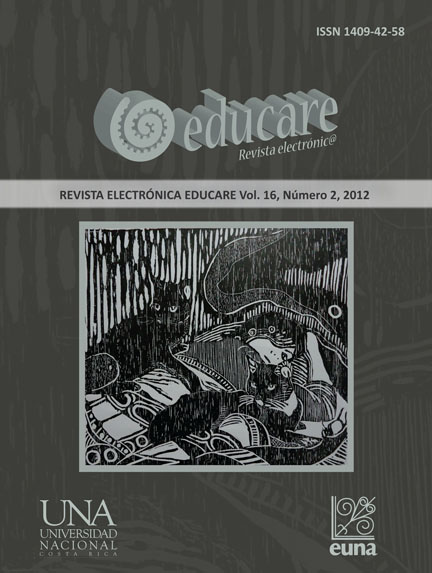Diagnosis of Student’s Attitudes towards Mathematics in the First Year of Three Graduate Programs in Business Administration
DOI:
https://doi.org/10.15359/ree.16-2.15Keywords:
Attitudes, graduate program, Mathematics, anxiety.Abstract
The objective of this research was to determine the student’s attitudes towards Mathematics at the beginning of their graduate studies in Business Administration. The study used an exploratory, non-experimental, cross-sectional design. The instrument used was a questionnaire based on willingness, confidence, utility, motivation and anxiety with Likert questions. The study concluded that students have a negative attitude towards Mathematics; it is considered as a useful but difficult discipline and, for that reason, students show anxiety and lack of confidence when applying mathematical procedures.
References
Allport, G. (1935). Attitudes. En C. Murchinson, M. A Worcester y M. A. Clark (eds.). Handbook of
social psychology (pp. 798-844). USA: Worcester Mass.
Álvarez, Y. y Ruiz, M. (2010). Actitudes hacia las Matemáticas en estudiantes de Ingeniería en
universidades autónomas venezolanas. Revista de Pedagogía, 31(89), 225-249.
Anastasi, A. y Urbina, S. (1998). Psicología. México: Prentice Hall.
Auzmendi, E. (1992). Las actitudes hacia la matemática-estadística en las enseñanzas medias y
universitaria. Bilbao: Mensajero.
Cacioppo, J. T. y Gardner, W. L. (1999). Emotion [Emoción]. Annual Review of Psychology, 50, 191-
Conejeros, M. L., Rojas, J. y Segure, T. (2010). Confianza: Un valor necesario y ausente en la educación
chilena. México: Perfiles Educativos, 32(129), 30-46.
Estrada, A. (2008). Actitudes hacia la estadística e instrumentos de evaluación. España: Universidad
de Lleida.
Gil, N., Blanco, L. J. y Guerrero, E. (junio, 2005). El dominio afectivo en el aprendizaje de las
Matemáticas. Una revisión de sus descriptores básicos. Unión, Revista Iberoameriana de
Eduación Matemática, 2, 15-32.
Gómez-Chacón, I. (2009). Actitudes matemáticas: Propuestas para la transición del bachillerato a
la universidad. Educación Matemática, 21(3), 5-32.
Guerrero, E., Blanco L. J. y Vicente, F. (2002). Trastornos emocionales ante la educación matemática.
España: Pirámide.
Hart, L. (1989). Classroom Processes, Sex of Student, and Confidence in Learning Mathematics
[Procesos en el salón de clases, sexo del estudiante y confianza en el aprendizaje de las
Matemáticas]. Revista Journal for Research in Mathematics Education, 20(3), 242-260.
Hernández, R., Fernández, C. y Baptista, P. (2010). Metodología de la investigación. México:
McGraw-Hill.
Hidalgo, S., Maroto, A. y Palacios, A. (2004). ¿Por qué se rechazan las Matemáticas? Análisis
evolutivo y multivariante de actitudes relevantes hacia las Matemáticas. Revista de
Educación, 334, 75- 95.
Kerlinger, F. y Lee, H. (2002). Investigación del comportamiento: Métodos de investigación en
Ciencias Sociales (4ª ed.). México: McGraw-Hill.
Likert, R. (1976). Una técnica para la medición de actitudes. Buenos Aires: Nueva Visión.
Lim, L. L., Tso, T-Y. y Lin, F. L. (2009). Assessing Science Students’ Attitudes to Mathematics: A Case
Study on a Modeling Proyect with Mathematical Software [Evaluación de las actitudes
de los estudiantes de Ciencias hacia las Matemáticas: Un caso de estudio en el Proyecto
Modelando con Software Matemático]. International Journal of Mathematical Education in
Science and Technology, 40(4), 441-453.
Mandler, G. (1989). Historia y desarrollo de la psicología de la emoción. España: Promolibro.
Organización para la cooperación y el desarrollo económico (OECD). (2004). Informe PISA
: Aprender para el mundo de mañana. España: Santillana. Parra, H. (marzo, 2005).
Creencias matemáticas y la relación entre actores del contexto. Revista Latinoamericana de
Investigación en Matemática Educativa, 8(1), 69-90.
Planchart, E., Garbín, S. y Gómez-Chacón, I. (2005). La enseñanza de la Matemática en Venezuela,
programa de didáctica de la Matemática para educación media. En I. M. Gómez-Chacón y
E. Planchart (Eds.). Educación matemática y formación de profesores. Propuestas para Europa
y Latinoamérica (pp. 33-50). España: Publicaciones de la Universidd de Deusto, Bilbao.
Pérez-Tyteca, P., Castro, E., Rico, L. y Castro, E. (2011). Ansiedad matemática, género y ramas de
conocimiento en alumnos universitarios. Enseñanza de las Ciencias, 29(2), 237-250.
Petriz, M. A., Barona C., López, R. M. y Quiroz, J. (octubre-diciembre, 2010). Niveles de desempeño
y actitudes hacia las Matemáticas en estudiantes de la Licenciatura en Administración en
una universidad estatal mexicana. Revista Mexicana de Investigación Educativa, 15(47), 1223-
Santrock, J. (2010). Psicología de la educación. México: McGraw-Hill.
Schofield, H. (mayo-junio, 1982). Sex, Grade Level, and the Relationship between Mathematics
Attitude and Achievement in Children [Sexo, nivel, grado y relación entre la actitud
matemática y logro en los niños]. The Journal of Educational Research 75(5), 280-284.
Downloads
Published
How to Cite
Issue
Section
License
1. In case the submitted paper is accepted for publication, the author(s) FREELY, COSTLESS, EXCLUSIVELY AND FOR AN INDEFINITE TERM transfer copyrights and patrimonial rights to Universidad Nacional (UNA, Costa Rica). For more details check the Originality Statement and Copyright Transfer Agreement
2. REUTILIZATION RIGHTS: UNA authorizes authors to use, for any purpose (among them selfarchiving or autoarchiving) and to publish in the Internet in any electronic site, the paper´'s final version, both approved and published (post print), as long as it is done with a non commercial purpose, does not generate derivates without previous consentment and recognizes both publisher's name and authorship.
3. The submission and possible publication of the paper in the Educare Electronic Journal is ruled by the Journal’s editorial policies, the institutional rules of Universidad Nacional and the laws of the Republic of Costa Rica. Additionally, any possible difference of opinion or future dispute shall be settled in accordance with the mechanisms of Alternative Dispute Resolution and the Costa Rican Jurisdiction.
4. In all cases, it is understood that the opinions issued are those of the authors and do not necessarily reflect the position and opinion of Educare, CIDE or Universidad Nacional, Costa Rica. It is also understood that, in the exercise of academic freedom, the authors have carried out a rogorous scientific-academic process of research, reflection and argumentation thar lays within the thematic scope of interest of the Journal.
5. The papers published by Educare Electronic Journal use a Creative Commons License:

















 The articles published by Educare Electronic Journal can be shared with a Creative Commons License:
The articles published by Educare Electronic Journal can be shared with a Creative Commons License: 



